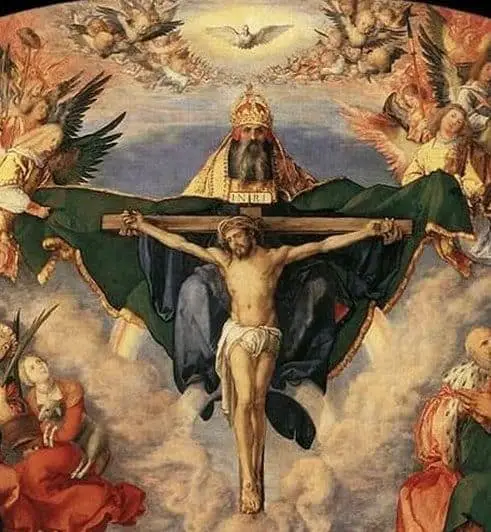The Athanasian Creed is a “short, clear exposition of the doctrines of the Trinity and the Incarnation, with a passing reference to several other dogmas” (1912 Catholic Encyclopedia). It is one of the approved professions of the truths of our holy Faith, and it dates back to the 4th or 5th century. It is now thought that St. Athanasius is not the author, although the creed reflects his influence. This creed may have been written or revised by St. Ambrose.
Because of its first word in Latin, the Athanasian Creed is sometimes referred to as the “Quicumque.” This creed has a detailed explanation of the mystery of the Holy Trinity.
Our beautiful Catholic faith teaches that there is One God in three Divine Persons–the Father, the Son, and the Holy Spirit. The Father is God, the Son is God, and the Holy Spirit is God. But there is only one God.
This is a supernatural mystery, meaning that it is a truth which we, with our limited human minds, cannot fully understand, but which we believe because we have God’s word for it (see reference from the Baltimore Catechism, quoted in our page on the Glory Be.)
“The mystery of the Most Holy Trinity is the central mystery of Christian faith and life. It is the mystery of God in himself. It is therefore the source of all the other mysteries of faith, the light that enlightens them. It is the most fundamental and essential teaching in the ‘hierarchy of the truths of faith.’ The whole history of salvation is identical with the history of the way and the means by which the one true God, Father, Son and Holy Spirit, reveals himself to men ‘and reconciles and unites with himself those who turn away from sin’” (Catechism of the Catholic Church, paragraph 234).

Whoever wills to be in a state of salvation, before all things it is necessary that he hold the Catholic Faith, which except everyone shall have kept whole and undefiled without doubt he will perish eternally.
Now the Catholic faith is that we worship One God in Trinity and Trinity in Unity, neither confounding the Persons nor dividing the substance. For there is one Person of the Father, another of the Son, another of the Holy Spirit. But the Godhead of the Father, of the Son, and of the Holy Spirit, is One, the Glory equal, the Majesty coeternal.
Such as the Father is, such is the Son, and such is the Holy Spirit; the Father uncreated, the Son uncreated, and the Holy Spirit uncreated; the Father infinite, the Son infinite, and the Holy Spirit infinite; the Father eternal, the Son eternal, and the Holy Spirit eternal. And yet not three eternals but one eternal, as also not three infinites, nor three uncreated, but one uncreated, and one infinite. So, likewise, the Father is almighty, the Son almighty, and the Holy Spirit almighty; and yet not three almighties but one almighty.
So the Father is God, the Son God, and the Holy Spirit God; and yet not three Gods but one God. So the Father is Lord, the Son Lord, and the Holy Spirit Lord; and yet not three Lords but one Lord. For like as we are compelled by Christian truth to acknowledge every Person by Himself to be both God and Lord, so are we forbidden by the Catholic religion to say there be three Gods or three Lords.
The Father is made of none, neither created nor begotten. The Son is of the Father alone, not made nor created but begotten. The Holy Spirit is of the Father and the Son, not made nor created nor begotten but proceeding. So there is one Father, not three Fathers; one Son, not three Sons; and one Holy Spirit, not three Holy Spirits. And in this Trinity there is nothing before or after, nothing greater or less, but the whole three Persons are coeternal together and coequal.
So that in all things, as is aforesaid, the Trinity in Unity and the Unity in Trinity is to be worshiped. He therefore who wills to be in a state of salvation, let him think thus of the Trinity.
But it is necessary to eternal salvation that he also believe faithfully the Incarnation of our Lord Jesus Christ. The right faith, therefore, is that we believe and confess that our Lord Jesus Christ, the Son of God, is God and Man.
He is God of the substance of the Father, begotten before the worlds, and He is man of the substance of His mother, born in the world; perfect God, perfect man subsisting of a reasoning soul and human flesh; equal to the Father as touching His Godhead, inferior to the Father as touching His Manhood.
Who although He be God and Man, yet He is not two but one Christ; one, however, not by conversion of the Godhead in the flesh, but by taking of the Manhood in God; one altogether not by confusion of substance but by unity of Person. For as the reasoning soul and flesh is one man, so God and Man is one Christ, Who suffered for our salvation, descended into hell, rose again from the dead, ascended into heaven, sits at the right hand of the Father, from whence He shall come to judge the living and the dead, at whose coming all men shall rise again with their bodies and shall give account for their own works. And they that have done good shall go into life eternal, and they who indeed have done evil into eternal fire.
This is the Catholic faith, which except a man shall have believed faithfully and firmly, he cannot be in a state of salvation.